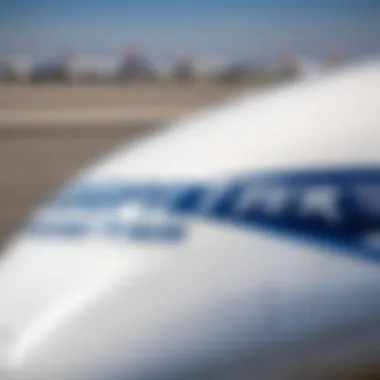EgyptAir: A Comprehensive Overview of the National Airline


Intro
EgyptAir, as the national airline of Egypt, has a pivotal role in connecting not only major cities within Egypt but also linking the country to numerous international destinations. This airline has roots that extend over eight decades. It serves as a vital conduit for travelers eager to discover the cultural and historical tapestry that the country has to offer.
In this article, we will delve into various aspects of EgyptAir. This includes the airline’s extensive history, its current fleet, the range of services provided, its vast route network, and the challenges it faces. Furthermore, we will analyze its significance in bolstering tourism and travel—both domestically and globally. By the end of this exploration, readers can well comprehend EgyptAir's significance in the aviation industry and its overarching cultural impact.
Популярные направления
EgyptAir offers an impressive array of routes that attract diverse travelers. The airline not only connects to major global hubs but also features some unique locations that cater to those seeking exciting and exotic experiences. Here, we will explore these popular destinations along with recommendations for family-friendly locations.
Уникальные направления для экзотических путешествий
EgyptAir unveils various remarkable destinations that are perfect for those desiring an adventure. Some notable ones include:
- Cairo: Notable for its monumental treasures including the Pyramids of Giza.
- Luxor: The gateway to the Valley of the Kings, rich in ancient history.
- Aswan: Offers scenic landscapes along the Nile River, ideal for exploration.
- Hurghada: A paradise for beach lovers and a hub for water sports enthusiasts.
These exotic destinations hold personal and historical significance. Each one tells a story while providing unique activities designed to enchant visitors.
Комфортные места для семейного отдыха
When traveling with family, comfort and suitable activities are essential. EgyptAir identifies itself with emphasizing family-friendly destinations that cater to all ages. Recommendations include:
- Sharm El Sheikh: A sun-drenched oasis with opportunities for snorkeling and family-oriented resorts.
- Dahab: A relaxed environment perfect for families looking for outdoor activities and explorations.
- Alexandria: Rich in history and culture, offers educational opportunities while enjoying the Mediterranean coast.
Traveling as a family creates lifelong memories. EgyptAir ensures that families can find comfortable and enjoyable locations that cater to every member's interests.
Подготовка к путешествию
Preparation is key when planning a trip, especially when traveling with EgyptAir. There are several aspects travelers can consider to ensure a seamless journey:
Советы по выбору маршрута
- Assess Flight Duration: Understanding travel time is critical for planning.
- Explore Connecting Flights: Sometimes, indirect routes can provide better deals and unique stopovers.
- Consider Layovers: Look at the airports where layovers occur, as they can enhance travel experiences.
Selecting the right route can significantly impact the overall travel experience.
Как собрать чемодан: полезные советы
Packing effectively guarantees a smoother trip. Here are some tips to make packing less daunting:
- Check Baggage Allowance: Ensure you know the limitations specific to EgyptAir’s policy.
- Make a Packing List: Planning ensures you won’t forget essentials.
- Roll Clothes: This saves space and reduces wrinkles in garments.
Efficient packing maximizes the enjoyment of traveling. With the right preparation, travelers can focus more on the experiences awaiting them.
EgyptAir not only serves as a means of transport but also as a bridge to enriching travel experiences that embody the essence of Egypt's grandeur.
Overall, EgyptAir stands as more than just an airline. It is a catalyst for discovering the beauty and cultural heritage of Egypt, making the journey both convenient and memorable.
Foreword to EgyptAir
Understanding EgyptAir offers valuable insight into not just an airline, but also a significant part of Egypt's identity and heritage. This national airline serves as a bridge connecting Egypt with the broader world, facilitating travel and trade. As the oldest airline in the Middle East and one of the world’s most historically rich carriers, EgyptAir reflects the evolution of aviation.
The significance of examining EgyptAir extends beyond operational details; it encompasses its cultural and economic impact. For travelers, EgyptAir provides pathways to ancient wonders, vibrant cities, and serene desert landscapes—all essential to the Egyptian experience. Furthermore, the airline's strategic decisions and developments have tangible consequences for the region’s tourism sector.
This section delves into the historical roots of EgyptAir, highlighting the pivotal moments that have shaped its current operations. By understanding the origins and milestones of this airline, readers can appreciate its role in the context of not only the aviation industry but also the national pride and tourism of Egypt.


The Origins of EgyptAir
EgyptAir began its journey in 1932, when it was founded as Misr Airwork. The main aim was to connect Egyptian cities and establish air travel infrastructure. The airline was initially a subsidiary of Egypt's national postal system. It started service with a limited number of routes.
In 1933, Misr Airwork launched its first international flight to Europe. This was a momentous occasion, marking Egypt's entry into the global aviation scene. The airline changed its name to EgyptAir in 1971, aligning its brand with national identity. Over the decades, EgyptAir expanded its fleet and enhanced its services, continually adapting to the advancements in aviation technology.
Key Milestones in Its Development
EgyptAir has seen several key milestones throughout its history:
- 1940: The introduction of Douglas DC-3 aircraft, which greatly improved passenger comfort and operational capacity.
- 1960s: Expansion into the long-haul market, connecting Egypt to destinations like New York and Tokyo.
- 1980s: EgyptAir became a member of the International Air Transport Association (IATA), enhancing its global presence and credibility.
- 2000: The airline commenced its privatization process, aiming to improve efficiency and service quality.
These milestones not only showcase EgyptAir's growth but also position it as a historical pillar in the aviation industry of the region.
Corporate Structure and Ownership
Understanding the corporate structure and ownership of EgyptAir is essential to grasp its operational dynamics and strategic direction. As a government-owned entity, EgyptAir operates within a framework that imposes certain obligations and benefits, influencing its decision-making processes and overall performance in the competitive aviation market. The ownership model shapes EgyptAir's development, resource allocation, and responsiveness to both domestic and international trends.
Government Stake and Influence
The Egyptian government holds a pivotal stake in EgyptAir, designating it as the national airline. This ownership provides significant advantages but also comes with challenges.
- Financial Support: The government can offer financial backing during downturns or crises, ensuring continuity in operations. This support has been crucial, especially in turbulent economic times.
- Regulatory Favor: Being a state-owned enterprise can sometimes lead to favorable regulations and policies. EgyptAir enjoys a level of security that private airlines may not have, which can be beneficial for its growth.
- Public Image: As a national airline, EgyptAir is a symbol of Egyptian pride. Its government ownership aligns with national interests, promoting tourism and connecting Egypt to the globe.
Despite the advantages, the government stake can lead to increased bureaucratic processes. Decisions may take longer due to the need for adherence to governmental protocols. Additionally, political instability can affect operations significantly. All these factors create a dual-edged sword that EgyptAir navigates while trying to maintain its service excellence.
Operational Autonomy and Challenges
While EgyptAir is under government ownership, it strives for operational autonomy to enhance efficiency and adaptability. This operational independence is critical in a highly competitive industry. However, maintaining autonomy in decision-making doesn't come without its own set of challenges.
- Balancing Act: EgyptAir often finds itself in a balancing act between government directives and the need to respond to market demands quickly. Just like many other national airlines, it aims to be profit-oriented while fulfilling national objectives.
- Resource Allocation: Decisions on resource allocation can become complicated due to the overlapping interests of stakeholders. The airline must prioritize routes and services that align with national policies but also meet passenger demands for profitability.
- Market Competition: The aviation sector is increasingly competitive, with both local and international players vying for market share. EgyptAir must remain innovative and responsive to consumer preferences, necessitating a level of autonomy that enables swift decisions.
"Understanding the balance of government involvement and operational needs is key to EgyptAir's strategies and future growth".
In summary, EgyptAir's corporate structure, defined by government ownership, shapes its operations and strategies significantly. Navigating the complexities of this structure requires a careful assessment of the advantages and challenges faced in a competitive aviation landscape.
Fleet Composition
Fleet composition is a crucial aspect of any airline's operations. For EgyptAir, it reflects the airline's commitment to providing reliable service while addressing evolving market demands. It encompasses the variety of aircraft in its lineup, including their models, age, and specific features that appeal to passengers. A well-maintained and diverse fleet is essential not only for operational efficiency but also for enhancing the passenger experience.
Current Aircraft Models in Service
As of now, EgyptAir operates a diverse range of aircraft. This includes models from both Boeing and Airbus. The mainstay of EgyptAir's fleet includes:
- Boeing 777-300ER: Known for its long-range capabilities and spacious configurations.
- Boeing 737-800: This aircraft serves regional routes efficiently with good fuel economy.
- Airbus A220-300: A relatively new addition that offers enhanced passenger comfort and cost-effective operational characteristics.
These planes are not only vital for domestic flights but also for international routes. Their performance metrics align well with EgyptAir’s strategic goals, particularly in maintaining fuel efficiency while reducing environmental impact.
Sustainability Initiatives and Upgrades
EgyptAir has taken significant strides towards sustainability. The airline recognizes the critical importance of minimizing its environmental footprint. Key initiatives include upgrading older aircraft with more fuel-efficient technologies. For instance, the introduction of new engines on older models has shown promise in reducing emissions.
Moreover, EgyptAir actively participates in programs aimed at reducing waste onboard. Initiatives such as recycling in-flight materials and streamlining meal services contribute to sustainability goals.
"The aviation industry faces mounting pressure to adapt to climate change. EgyptAir is making strides to ensure its operations align with global sustainability standards."


Passenger Services and Amenities
Passenger services and amenities play a vital role in shaping the travel experience with EgyptAir. As a national airline, EgyptAir aims to deliver not only transportation from one point to another but also a comforting and engaging journey for its passengers. The airline's focus on passenger experience is critical in maintaining its brand image and enhancing customer loyalty. Understanding the various offerings available onboard allows travelers to make informed choices that best suit their needs.
Cabin Classes Offered
EgyptAir presents a range of cabin classes to cater to diverse passenger preferences. The main classes are Economy, Business, and First Class.
In Economy Class, travelers can expect comfortable seating, generous legroom, and various entertainment options. This class is engineered for efficiency while ensuring a pleasant journey. Business Class takes the experience up a notch with larger seats that can convert into beds, priority boarding, and enhanced dining options. Finally, the First Class cabin stands out with utmost luxury, offering exclusive services, personal attention from flight attendants, and gourmet meals.
These different cabin classes empower passengers to choose based on their preferences and budgets, making EgyptAir an inclusive choice for travelers.
In-Flight Entertainment and Connectivity
In-flight entertainment is another critical aspect of passenger services. EgyptAir provides a well-curated selection of movies, TV shows, and documentaries to keep travelers engaged during their flights. Modern aircraft are equipped with personal screens, ensuring that each passenger has access to a variety of entertainment options.
Moreover, free Wi-Fi is available on many flights. This connectivity allows travelers to stay connected even at 30,000 feet. It’s an essential service for business travelers who may need to communicate while in transit, as well as for leisure travelers wanting to share their experiences in real-time.
Culinary Offerings
Culinary experiences aboard EgyptAir are carefully crafted to reflect the rich heritage of Egyptian cuisine. Passengers can savor traditional dishes, designed to provide a taste of Egypt while in the air. Meal options vary depending on the cabin class; Business and First Class passengers enjoy an elaborate menu, which includes regional specialties and global fare.
Special dietary requirements, such as vegetarian, gluten-free, and halal meals, can be accommodated upon prior request. EgyptAir aims to ensure that all passengers have a satisfying onboard dining experience tailored to their preferences.
"EgyptAir views passenger comfort as a priority, integrating services that resonate with travelers' needs and expectations."
EgyptAir's Route Network
The route network of EgyptAir is a crucial aspect of its operations and contributes significantly to its standing as Egypt's national airline. This network facilitates connectivity between Egypt and numerous global destinations while serving domestic travelers effectively. An efficient route network enhances operational efficiency, maximizes resource utilization, and elevates customer satisfaction, providing a comprehensive travel experience.
Domestic Destinations
EgyptAir provides a vital link across various domestic locations in Egypt, which is of great importance for both residents and tourists. Major cities like Cairo, Alexandria, Luxor, and Sharm El Sheikh are critical stops within the country that connect different regions. These routes support not only regional business activities but also contribute to the tourism sector by enabling travelers to explore Egypt's historical sites and beauty.
- Cairo serves as the central hub for EgyptAir, making it easy for different passengers to access the rest of the country.
- Alexandria, known for its rich maritime history, is another key destination, popular among travelers.
- Luxor, home to ancient temples and tombs, attracts cultural tourists, fostering an appreciation for Egypt's heritage.
- Sharm El Sheikh, with its stunning Red Sea coastline, is a prime spot for leisure and water sports, drawing in both local and international visitors.
The focus on domestic connectivity allows EgyptAir to strengthen its market presence, ensuring that it meets the travel needs of its diverse clientele.
International Routes and Expansion
EgyptAir's international route network illustrates its ambition to connect Egypt to a broader world while promoting Egypt as a hub for travel and commerce. The airline operates flights to numerous destinations across Africa, Europe, the Americas, and Asia. Recent expansions reflect a strategic approach to meet growing travel demand, offering more options for passengers seeking to fly to and from Egypt.
- Africa: EgyptAir serves key cities, such as Nairobi and Johannesburg, facilitating trade and tourism within the continent.
- Europe: Popular destinations include London, Frankfurt, and Rome, catering to both Egyptians outbound for business or leisure and Europeans visiting Egypt.
- The Americas: Routes to New York and Miami connect Egypt to a significant diaspora and tourism market, enhancing cultural exchange.
- Asia: Expanding to cities like Dubai and Beijing reflects EgyptAir's commitment to tapping into expanding markets and opportunities.
Additionally, the airline's membership in the Star Alliance enhances its connectivity, offering passengers wider access to the global airline network. EgyptAir demonstrates its resilience and adaptability in the face of competitive challenges as it navigates the international aviation landscape.
"EgyptAir's extensive route network not only facilitates travel but also contributes significantly to Egypt's economic growth and cultural exchange."
Cultural Significance
The cultural significance of EgyptAir extends beyond mere transport. This national airline plays a vital role in embodying the Egyptian identity and facilitating international relations. It bridges gaps between the past and the present by making Egypt accessible to the world. As a stated conduit for cultural exchange, EgyptAir enables passengers to experience the nation’s rich heritage and modern developments. Moreover, it aids in the promotion of national pride for Egyptians both domestically and abroad.
EgyptAir in National Identity
EgyptAir is an emblem of national pride. After its establishment in 1932, it became a symbol of modernity in Egypt, representing progress in aviation. The airline is known for proudly displaying the Egyptian flag on its aircraft. This not only fosters a sense of identity but also resonates with travelers who associate their journey with the rich history of ancient Egypt.
EgyptAir frequently participates in events that celebrate Egyptian culture, positioning itself as a key player in showcasing Egypt’s heritage on a global platform. When passengers board EgyptAir flights, they often find themselves surrounded by images and symbols that reflect the country's history. This reinforces the connection between the journey and the cultural narratives of Egypt.


Promotion of Egyptian Tourism
One of EgyptAir's essential functions is boosting tourism. The airline connects major cities worldwide with local destinations, making Egypt more accessible to international travelers. The promotional strategies of EgyptAir often emphasize the magnificence of attractions such as the Pyramids of Giza and the Nile River. By marketing these sites, EgyptAir helps project a favorable image of the country, thus attracting tourists.
The airline also collaborates with the Egyptian government and tourism boards to facilitate travel packages that promote tourism. Such initiatives not only enhance travel convenience but also support local businesses, ensuring that tourism yields economic benefits.
Challenges Facing EgyptAir
Understanding the challenges facing EgyptAir is crucial. This knowledge elucidates the airline's current operational state and short-term viability. As a national carrier, EgyptAir operates within a complex environment. Factors such as operational issues, economic fluctuations, and competitive dynamics shape its journey. Examining these elements enables a comprehensive grasp of EgyptAir's capacity to navigate future uncertainties and maintain its status in the aviation sector.
Operational Issues
EgyptAir encounters numerous operational challenges that affect its efficiency. Flight delays, maintenance issues, and logistical hurdles contribute to a less-than-optimal performance. For instance, the aging fleet requires more frequent maintenance, resulting in longer turnaround times. Additionally, staffing shortages during peak travel seasons create strains on operations. Such issues not only impact customer satisfaction but also hinder the airline's ability to compete effectively.
Frequent operational problems may lead to customer dissatisfaction. In the modern aviation landscape, where travelers have high expectations, reliability becomes paramount. Passengers increasingly favor airlines that can guarantee timely departures and arrivals. Operational failures, therefore, can tarnish EgyptAir's reputation. This can result in lost customers and reduced revenue.
Economic Uncertainties
The broader economic environment presents further challenges to EgyptAir. Fluctuations in fuel prices, currency volatility, and unpredictable economic policies can significantly impact operational costs. For example, when oil prices rise, the cost for airlines increases sharply. These fluctuations are often beyond the airline's control, creating budgeting complications.
Moreover, political instability in the region can deter potential passengers, affecting overall demand. Economic uncertainties can lead to cautious spending by consumers, which translates to reduced bookings. Therefore, EgyptAir must develop adaptive strategies to mitigate these risks. This includes financial planning and exploring additional revenue streams beyond passenger travel, such as cargo services.
Competition in the Aviation Sector
The competitive landscape in the aviation sector is fierce. EgyptAir faces competition not only from regional airlines but also from international carriers. Gulf airlines, like Emirates and Qatar Airways, have established robust reputations for excellent service and modern fleets. This growing rivalry pressures EgyptAir to elevate its own service standards and fleet quality.
To remain viable, EgyptAir must differentiate itself. This could involve enhancing passenger experiences, expanding route networks, or innovating service offerings. The rise of low-cost carriers further complicates the scenario, as it attracts price-sensitive travelers. Competing with these airlines requires a careful balance between cost management and service offerings.
In summary, EgyptAir faces multi-faceted challenges. Operational inefficiencies, economic instability, and competitive pressures require strategic navigation. Understanding these factors is vital for stakeholders, including travelers and investors, who monitor the airline’s health and prospects.
Future Prospects
The future prospects of EgyptAir hold significant promise, particularly in an industry that is continually evolving. The airline's ability to adapt to changing market dynamics, enhance its service quality, and embrace technological advancements is crucial. This section details the strategic initiatives and investments EgyptAir is planning, providing insight into how these efforts aim to bolster its position in the aviation sector.
Strategic Initiatives for Growth
EgyptAir is currently focused on several strategic initiatives that are aimed at driving growth. One of the primary focuses is expanding its route network. This involves opening new international destinations while strengthening domestic connectivity. Such measures are not only vital for increasing passenger numbers but also improving tourism flow into Egypt.
Furthermore, EgyptAir is investing in partnerships with other airlines. By collaborating through code-sharing agreements, the airline can offer its passengers more travel options and seamless connections. This strategy can lead to enhanced customer satisfaction and loyalty.
The airline is also committed to improving operational efficiency. This includes optimizing flight schedules, enhancing staff training, and streamlining processes. Increased efficiency can lead to reduced operational costs, ultimately benefiting passengers with more competitive fares.
Investments in Technology and Infrastructure
In an age where technology plays a pivotal role in aviation, EgyptAir recognizes the need for substantial investments. Upgrading the existing fleet with more fuel-efficient and modern aircraft is one area of focus. This change not only reduces operational costs but also aligns with global trends toward sustainability.
Additionally, EgyptAir is set to improve its digital infrastructure. This includes enhancing mobile apps for booking, check-in, and customer service. A robust digital platform can significantly improve customer experience, making travel more convenient.
Investing in airport infrastructure is also on the agenda. EgyptAir aims to work with the government to ensure that both Cairo International Airport and others in the network can handle increased passenger traffic efficiently. Improving facilities and services at airports can attract more travelers, both domestically and internationally.
"The aviation industry is entering a new era, and for airlines like EgyptAir, adapting is not optional but essential."
The End
The analysis presented in this article marks a pivotal conclusion regarding EgyptAir and its extensive role within the aviation industry. This summary encapsulates critical insights into EgyptAir's history, fleet composition, services, and challenges. Overall, understanding these elements sheds light on the national airline's significance in both domestic and international spheres.
Summary of Key Points
- Historical Context: EgyptAir's origins date back to the 1930s, outlining its evolution into a major player in global aviation.
- Fleet Diversity: The airline operates a varied fleet, emphasizing modernity and sustainability with a commitment to environmental responsibility.
- Passenger Experience: EgyptAir provides a range of cabin classes, in-flight entertainment, and culinary offerings, aiming to enhance the travel experience for all passengers.
- Route Network: The extensive domestic and international routes connect Egypt with critical global destinations, reinforcing its importance in the global travel network.
- Cultural Significance: EgyptAir is not just a transportation provider; it is a cultural ambassador, promoting Egyptian tourism and identity effectively.
- Current Challenges: The airline faces operational issues, economic uncertainties, and stiff competition. Recognizing these challenges is crucial in evaluating its future prospects.
- Future Strategies: EgyptAir's focus on technology and strategic growth initiatives hints at a roadmap designed to navigate its operational hurdles while pursuing expansion.
The Ongoing Journey of EgyptAir
EgyptAir's future remains an evolving narrative. As the industry changes, so too must the strategies of this national carrier. Investments in technology will play a crucial role in enhancing efficiency. Moreover, adapting to market demands, such as increased sustainability efforts, will determine its competitive edge in the aviation sector. The journey is both challenging and full of prospects, ultimately shaping EgyptAir’s identity as a resilient and adaptive airline.







